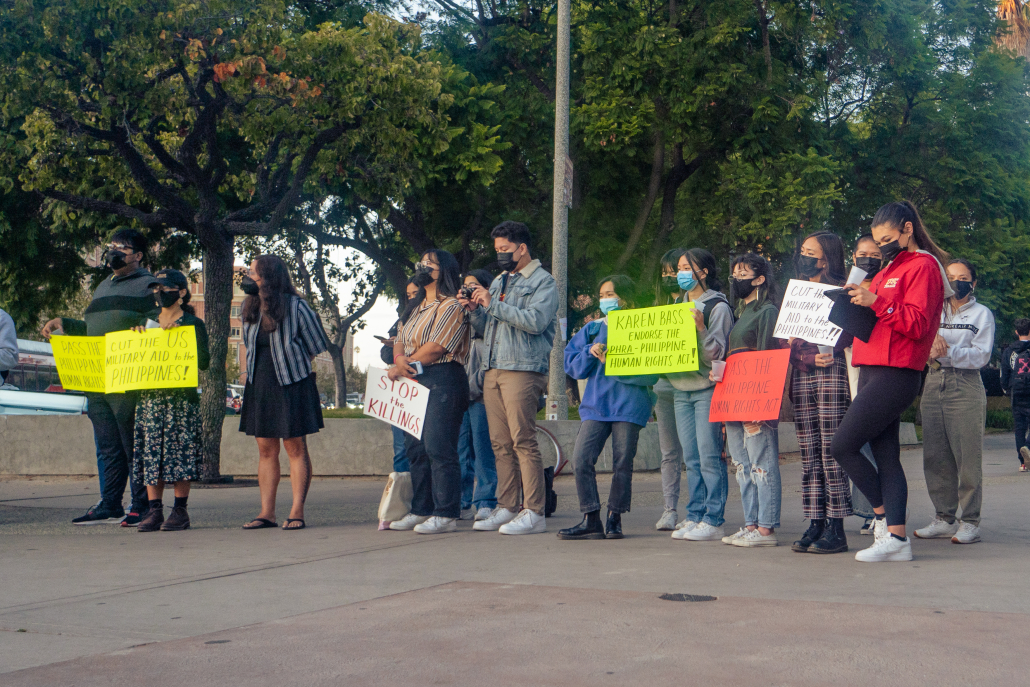Students hold vigil for Duterte victims

Holding photos of police violence victims and chanting “no more money for Duterte’s crimes,” more than 30 USC students and community members gathered Monday night to honor victims of Philippine President Rodrigo Duterte’s war on drugs and to endorse the passage of the Philippine Human Rights Act.
The event was organized by USC Troy Philippines, the Philippine Human Rights Act District 37 Campaign, Anakbayan Los Angeles, Kabataan Alliance and Migrante Los Angeles. It had speeches, a musical performance, an interfaith prayer and call to action in support of Pilipino human rights.
Speakers reflected on the loss of the victims and expressed support for the Philippine Human Rights Act. The act would end the United States’ funding to the Philippine army and police, which human rights activist groups say Duterte has weaponized against Philippine citizens, especially the urban poor, until certain human rights measures are met. The U.S. government provided over $550 million of military assistance to the Philippines between 2016 and 2019, according to the Stratbase ADR Institute.
Troy Philippines president Johannah Suegay, a senior majoring in communication, spoke to the crowd about the history of Pilipino activism and the importance of the PHRA.
“USC Troy Philippines and countless other Pilipino youth organizations exist today to embody this long-lasting legacy of youth activism,” Suegay said. “Our organizations were created to be active, to be political and to fight for change. The Pilipino youth has always demanded for more — demanded better for our communities, our country and our future. As an organization, we endorse the Philippine Human Rights Act and urge U.S. Representative Karen Bass of District 37 here in Los Angeles to do the same.”

Alex Montances, a volunteer with the Philippine Human Rights District 37 Campaign team and an administrative assistant at the Dornsife USC Wrigley Institute, emphasized the movement’s importance, asserting that money sent to the Philippine government to expand its police power would be better used helping local communities.
“We don’t want our U.S. tax dollars to be used for violence or hurting people in the Philippines,” Montances said. “It’s better for healthcare education or even serving our communities here.”
When it was introduced in the last Congressional session, the Philippine Human Rights Act amassed several cosponsors. California’s 37th District congresswoman Karen Bass was not among them.
Bass, whose district encompasses much of the area southwest of Downtown Los Angeles, including USC’s University Park campus, sits on the House Foreign Affairs Committee and chairs a subcommittee on global human rights. She’s now a candidate in the L.A. mayoral race, but activists such as Montances are continuing their work to obtain her support for the PHRA.
“Whether she runs for mayor or not, we’re part of her constituency,” Montances said. “We are from Los Angeles. Even Karen Bass is actually a USC [alumna]. For us, we [want her to] listen to the community.”
Adilene Klink, a freshman majoring in psychology, read the names and told the stories of victims while the crowd lit candles to honor the lives lost.
“Even though it is such a sad topic to be talking about and speaking about, I felt I was able to actually find a connection to these names not [by] personally knowing them, but [by] being able to read their stories,” Klink said. “These were living people, just like you and me, who were just killed by the [Duterte] administration and the deaths could have been avoidable… They were taken too soon.”
In addition to asking for Bass’ support, students stressed the need for USC to take actions in support of Pilipino human rights.
“First of all, it’s Pilipino-American History Month. We’re trying to get the University to acknowledge that, or at least recognize that, on a larger scale,” Suegay said. “Hopefully by recognizing that and celebrating our history and our culture, we’re able to also bring [these issues] to light.”

